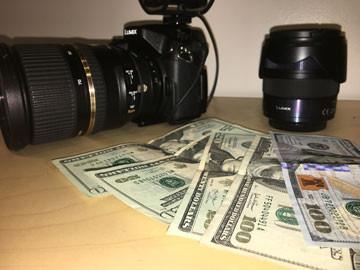By Katie Conlon
Everyone who decides to pursue a career in film or video initially envisions themselves stepping onto the stage of the Kodak Theater in Hollywood to accept their Academy Award for Best Film in Human History. Obviously, only a select few will ever make it that far, but that doesn't mean you can't still have a lucrative career in videography and/or amateur film production. There are hundreds of ways to use your skills and training to work full-time in videography.
 Photo by An Mai | CC BY-SA 2.0
Photo by An Mai | CC BY-SA 2.0
First and foremost, the terms video and film are not mutually exclusive in today's technologically advanced world. In fact, film is rarely used at all anymore, even in Hollywood. Today, being a trained videographer means you are also equipped with the knowledge and skills necessary to produce amateur films. What it can also mean is that you are versatile and and flexible enough to make commercials, documentaries, YouTube videos, event videos, and much, much more. Here is a list of some of the more common revenue streams currently available to a trained videographer.
Online Content
No matter what kind of video you make, there's a place for it somewhere on the Internet. Whether you are creating instructional videos, documentaries, comedic skits, interviews, commentary on society or politics, self-help videos, etc., you can generate revenue if you know how to push your work to the right demographic. YouTube is the most popular online video hosting site in the world right now, although there are many, smaller competitors. Online videos generate income in a number of ways. Advertisements that play before your video (once it gets enough views) pay you a percentage from Google Adwords. YouTube (and some other hosting sites) also offers a fan-funding program allowing you to take donations from your fans. Some companies can be contacted directly in order to broker deals for merchandise and service inclusion in your videos. If you become popular enough, you may be approached by businesses wishing to sponsor your continued video productions in exchange for endorsements. Finally, you can set a fee for your video. If, for example, you have produced a series of instructional videos on guitar playing, you can offer the first few lessons for free and require a small fee for the viewing of subsequent lessons.
Events
Unfortunately, most videographers look at wedding videos as the proverbial booby prize of the videography industry. However, weddings are just one of many types of events that require the services of professional videographers. Anniversaries, parties, seminars, business conferences, educational institution events, and live music performances are among the many types of events that could benefit from your services. Fees for professional event videographer services can be rather high depending on demand, experience, and client budgets. Many of these events can also generate a secondary income from copies of the video sold or broadcast in the future if you negotiate a percentage deal with your client(s).
Corporate Videos/Advertisements
All of those corporate training, safety, and harassment videos you've seen were put together by a video production company. Once you've completed enough projects to put together a nice demo reel of your work, you can begin to approach local businesses that may need your services. These types of videos usually come with strict instructions concerning the information that must be covered in the final video. This is especially true of any videos that involve the presentation of legal information. If you are hired to make a sexual harassment video, for example, you will be expected to cover all of the state/federal laws and corporate bylaws that pertain to sexual harassment. There isn't a lot of room for creativity in such videos, but the paycheck will be worth it. Businesses also need videographers to produce their advertisements. Car dealerships, local shops and restaurants, law firms, doctors' offices, tax preparers, wholesalers, and others typically spend a lot of money on local advertising. Cable providers offer advertising slots for local ads on every channel (even the big ones like TNT, USA, FX, MSNBC, etc.), so the income potential in advertising can be high.
Independent Movies
There are considerably more potential income opportunities for independent films today than ever before. Numerous streaming services, mobile device apps, film festivals, art houses, and YouTube series make it easy for an independent filmmaker to get their work to potential fans and generate an income. One YouTube series, called Marble Hornets, enjoyed viral success back in 2009 simply by producing dozens of short, fictional "found footage" videos of a filmmaker who came into contact with an ominous, supernatural creature called Slenderman. Some of these videos lasted less than a minute, others were over 20 minutes long, and the series was intensely suspenseful and utterly terrifying. The YouTube ad revenue and DVD/Blu-Ray sales resulted in a substantial profit for this extremely low-budget video series. Finally, there are numerous streaming services like Netflix, Pureflix, Shudder, and others that offer to include independent movies or documentaries on their service if the videos meet their requirements. Theatrical distribution is no longer necessary for a filmmaker's success.
With millions of videos now on TV, the Internet, in businesses, and elsewhere, we find ourselves living in a videographer-friendly society. Hard work and a good business sense can take your love of videography to a new, profitable level. You should devote yourself to learning everything you can about cameras, video equipment, non-linear editing software, scene direction, lighting, advertising, business, online services, and anything else that could possibly pertain to your field. If you put in enough work and enough study your efforts will not go unnoticed and your videography business will begin soaring towards success.


